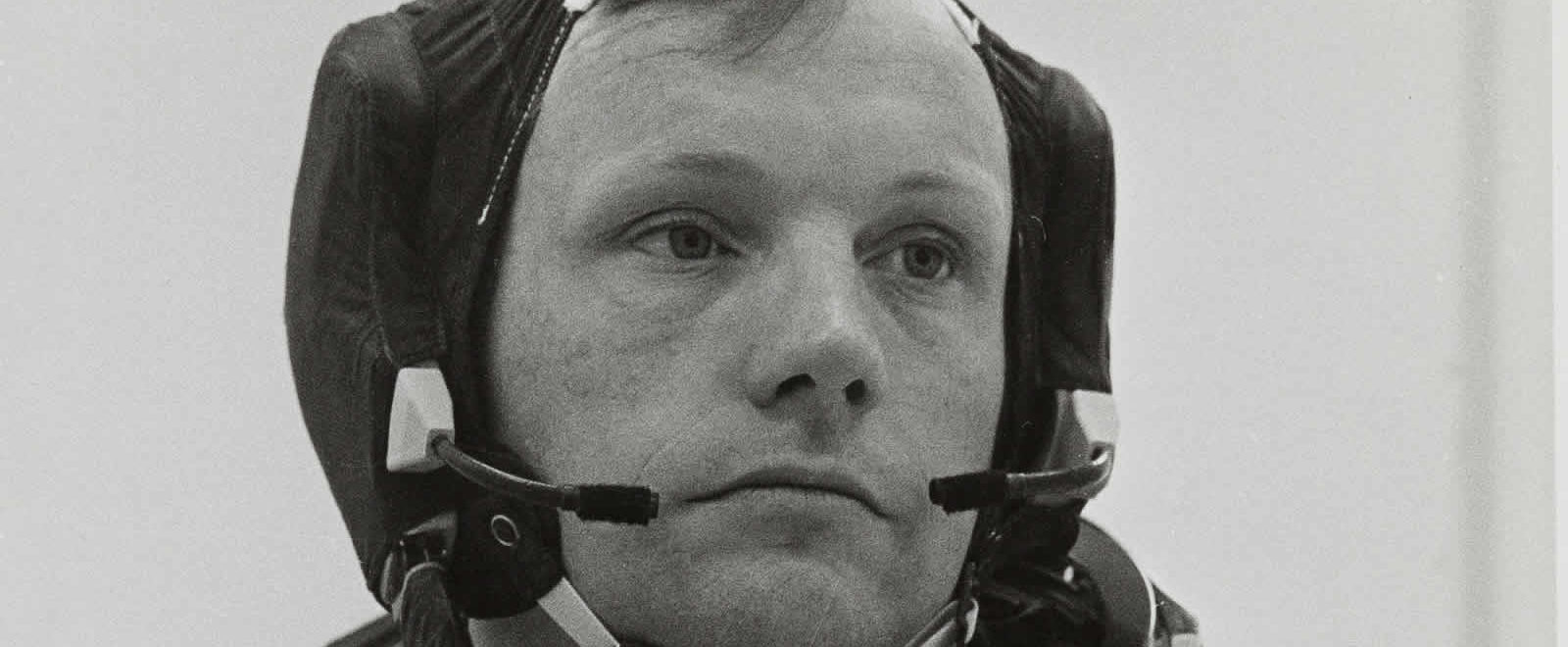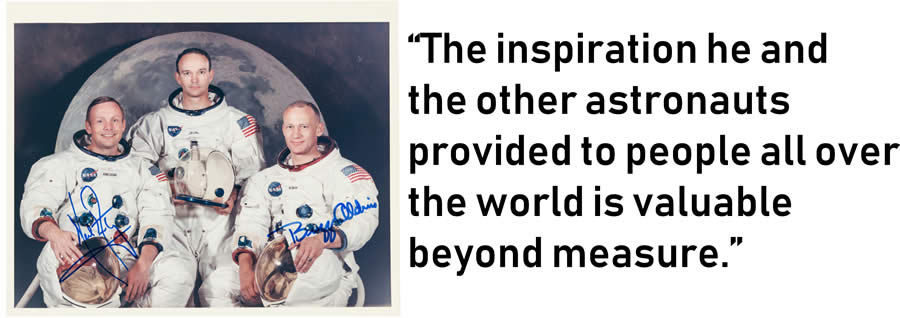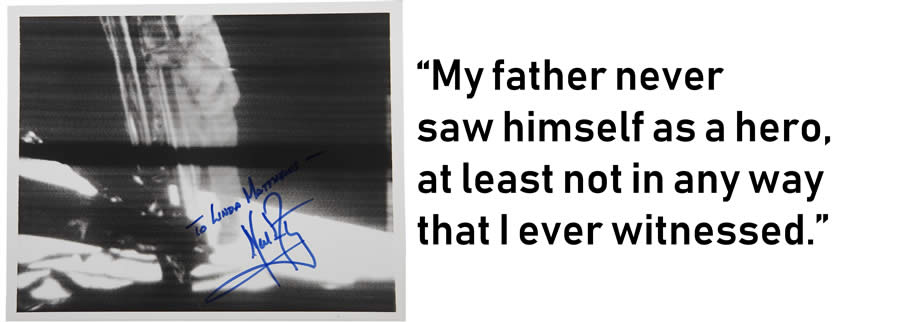FAMILY OF AMERICAN SPACE HERO SHARING ITEMS FROM HIS PERSONAL COLLECTION WITH FANS AROUND THE WORLD
Interview by Hector Cantú
On July 16, 1969, Apollo 11 blasted off from Florida. Four days later, the Lunar Module landed on the surface of the moon and Neil Armstrong became the first person to step onto another planetary body.
It ranks as perhaps the most monumental event in human history.
For 2½ hours, Armstrong and Edwin “Buzz” Aldrin walked on the surface, doing experiments and collecting moon dirt and rocks. They planted a U.S. flag and returned to orbit, joining command module pilot Michael Collins and returning safely to Earth on July 24.
EVENT
SPACE EXPLORATION SIGNATURE® AUCTION 6205
Featuring Artifacts from The Armstrong Family Collection™
Nov. 1-2, 2018
Live: Dallas
Online: HA.com/6205a
INQUIRIES
Michael Riley
214.409.1467
MichaelR@HA.com
“It was one of the most daring and inspiring human feats in the history of the world,” says Todd Imhof, executive vice president at Heritage Auctions.
In the decades since the landing, Armstrong’s legacy as a true American hero has only grown. “Neil was among the greatest of American heroes,” President Barack Obama said at the time of Armstrong’s death in 2012 at the age of 82. “When Neil stepped foot on the surface of the moon for the first time, he delivered a moment of human achievement that will never be forgotten.”
Enlarge

Portrait by Peggy Joseph
Now, the Armstrong family is partnering with Heritage Auctions to offer unique artifacts from The Armstrong Family Collection™.
“Working with Neil Armstrong’s sons has been a great privilege,” Imhof says. “They have conducted themselves with the highest level of integrity and are always focused on preserving their father’s reputation and legacy.”
Space memorabilia is not a new category, Imhof adds. “But in the space community, items from Neil Armstrong are always the most coveted. His lifetime legacy will be honored with items reflective of all of his achievements, not just his famous lunar landing. These are some of the most iconic historical items ever to be sold.”
We spoke to Armstrong’s sons Mark and Rick about the first of three scheduled auctions of items from The Armstrong Family Collection™ and about their father’s lasting legacy.
Can you describe how busy it’s been with the 50th anniversary of the moon landing coming up next year?
Rick: It definitely feels like it is getting busy. I have been hearing about various events for a year already and I hope to be able to attend as many as possible.
Mark: I’ve certainly seen an increase in activity and interest as we approach the 50th anniversary of the Apollo 11 moon landing. Not only is the feature film First Man due out this fall, but there are a number of documentaries under way worldwide that will captivate audiences and continue to build interest in space exploration. First Man has all the signs of an award-winning blockbuster, and I am also enthusiastic about a documentary that is being created by the same team that produced Gene Cernan’s The Last Man on the Moon, as well as Mission Control: The Unsung Heroes of Apollo.
Enlarge
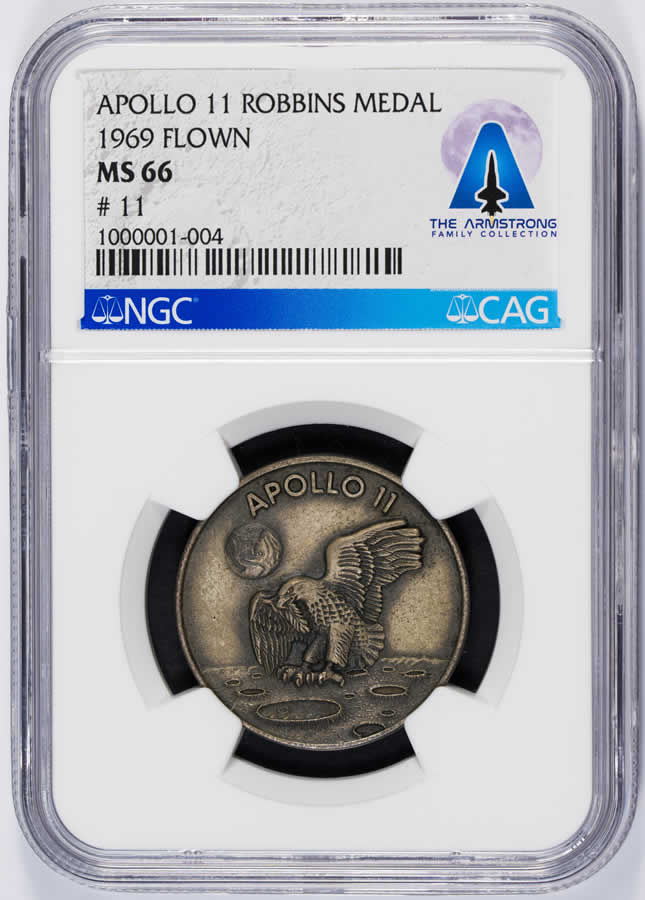
What are some of the important events taking place?
Mark: Museums around the world are ramping up for a celebration of the anniversary, and STEM/STEAM programs are springing up like daisies. The Armstrong Air and Space Museum in Wapakoneta, Ohio, is adding a new wing with expanded display and classroom space. The Exploration Museum in Husavik, Iceland, is expanding and creating a replica of the Apollo 11 Lunar Module “Eagle” for education. The Museum of Flight in Seattle, where I have the honor to serve as trustee, has a wide variety of programs to enthrall visitors and inspire future generations of space-faring professionals. In addition, the much-heralded “Destination Moon” traveling exhibit will be installed at the Museum of Flight for the 50th Anniversary in July 2019, and that will be an exhibit that is not to be missed.
What do you hope is the big takeaway from the 50th anniversary celebration?
Mark: It is my hope that programs like these will continue to highlight the importance of space exploration around the world, not just because of what it means for those directly involved, but because it provides a rich canvas for all of us to dream big dreams and simultaneously believe that they can actually come true. This emotional empowerment is an adrenaline shot to the human condition, and may be the greatest legacy of Mercury, Gemini and Apollo.
It’s exciting to hear that space exploration fans will have a chance to own items that belonged to your dad. Can you tell us what types of items are being offered at the upcoming auctions?
Mark: My mother and father saved everything, with the exception of my brother’s comic book collection, which he is still sore about, and so there is a wide variety of items that will be offered. First and foremost are the items that were intended to be collectible – items such as postal covers, patches, stamps and medallions. There will be flown items, autographed items and items of historical significance. There will be items that make you think, items that make you laugh and items that make you scratch your head.
Enlarge
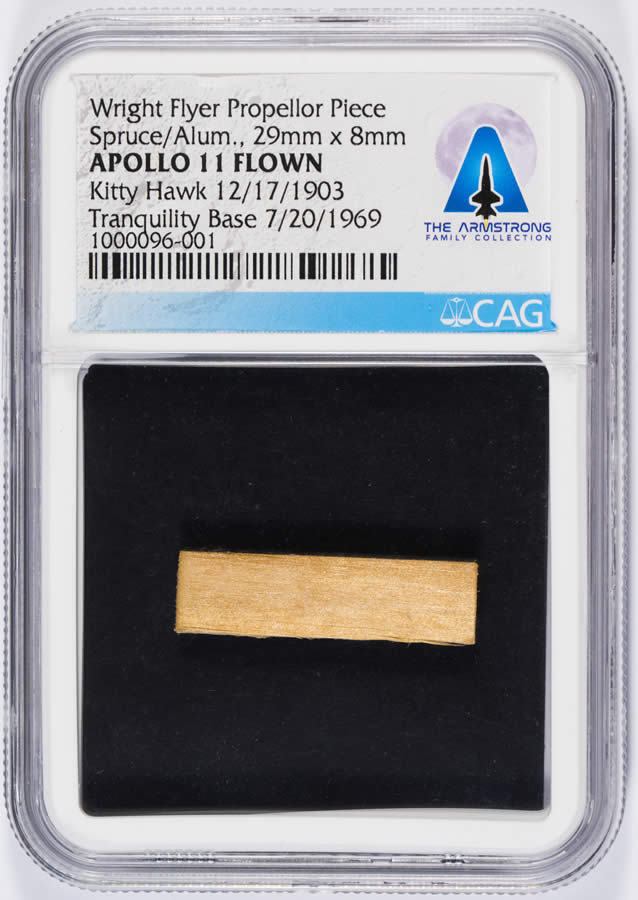
The movie coming out this fall is based on the book First Man: The Life of Neil A. Armstrong by James R. Hansen. How would you describe the whole “Hollywood experience” of taking your dad’s story to the big screen?
Rick: I’ve been very impressed with everyone I’ve met on the First Man production. Their attention to detail has been incredible. I’m sure it is going to be a bit surreal to see it all represented on the big screen. I’m optimistic about how the movie is going to turn out, and I have a feeling [director] Damien [Chazelle] has something special up his sleeve for us.
Mark: I have been involved with the movie on a number of different levels – as a script reviewer, a firsthand source and an actor.
You’re in the movie?
Mark: I was grateful that Damien accepted my audition tape and cast me in the part of Paul Haney, the Mission Control Public Affairs Officer on duty during the critical portion of the Gemini VIII flight. Paul, known as the voice of Mission Control, was a very well-regarded journalist who worked for NASA and whose job it was to describe, in layman’s terms, what was happening on the mission so that Walter Cronkite and other folks reporting the news could easily pass the information along to the public. You might think of Paul as a play-by-play announcer for the space program. My son Andrew was also cast as a Flight Controller in Mission Control, so it was special for us to enjoy the “Hollywood experience” together.
One quick story: In addition to the news agencies, Paul Haney’s audio feed was also broadcast on the squawk boxes, the little black boxes that were placed in the homes of the astronauts on a mission so that the wives and families could follow along with the mission. At one point in the movie, [astronaut and NASA’s first Chief of the Astronaut Office] Deke Slayton asks Paul Haney to cut the feed to the squawk boxes because he is worried that the astronauts are in mortal danger and he doesn’t want the families to listen to a potential tragedy in real time. When you see what happens in the movie, you will no doubt appreciate the irony that I was the one that played the part of the guy who flipped the switch that turned off the squawk boxes.
So you met a lot of key people on the crew?
Mark: I reviewed the script several times and supplied [screenwriter] Josh [Singer] and Damien with detailed feedback. I also had the pleasure of meeting with Ryan [Gosling] and Claire [Foy] to discuss life at home and what my parents were like in the 1960s. I found both actors to be extremely gracious and keenly interested in acquiring any information that would help them portray their characters more accurately and completely.
Enlarge
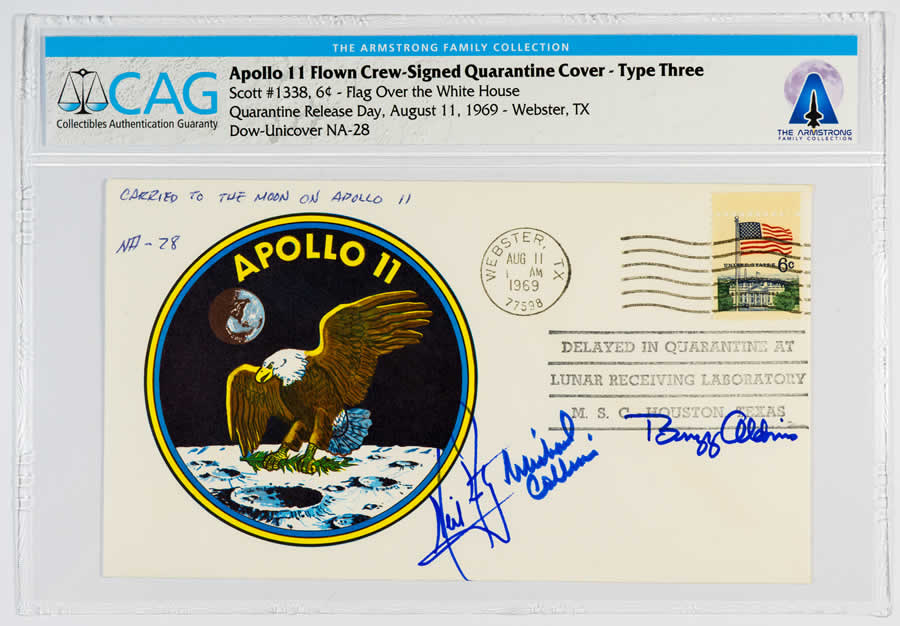
I imagine the family was an important source of details for the movie?
Mark: I was pleased to contribute to the research phase of the movie by providing a number of family photos as well as an audio recording of an oral history that my parents had given in the late 1960s. Ryan and Claire were able to study this recording for accents and speech patterns, while Damien and Josh were able to use it as a firsthand source of my parents’ perspectives from that time period. In fact, some of the interview content was actually added to the script and contributes in an important way to my father’s character development.
First Man screenwriter Josh Singer has said, “Neil’s heroism isn’t because he landed on the moon, it’s because he had the wherewithal to live through it all.” Do you agree with that?
Mark: My father never saw himself as a hero, at least not in any way that I ever witnessed. Instead, he viewed himself as a man performing his job to the very best of his ability. If that makes one a hero, then we have a planet full of heroes, and I find that to be an encouraging thought.
What, for you, is the ultimate goal of the movie?
Rick: I hope that it is historically accurate where it needs to be. It is a movie, not a documentary, so I know that some creative license with events will be taken. They have really done their research, so if there is something factually inaccurate in the movie, I expect it will have been done for a specific reason, not because they didn’t know what the facts are. I hope the way Mom and Dad are represented does them justice … and I hope my Dad’s sense of humor gets a chance to come out. I hope that there will be some who come out of the movie and want to learn more about the space program … then and now.
Mark: It is my sincere hope that the movie reminds us of what we can accomplish when we all work together and have a clear, common vision. And I hope that leaders around the world are reminded of the core values that are required to achieve great things – because it is very much their responsibility to nourish a way of life that encourages us to push beyond our limits and attempt to accomplish things our forebears never thought possible.
As far as the auction, where do you hope the items being sold end up? What is the ideal home for these artifacts?
Mark: The approach we are taking by partnering with CAG [Collectibles Authentication Guaranty] and Heritage Auctions ensures that each and every item will be photographed and cataloged, so that, if needed, they can be referenced later for research or any other purpose. It was important to us that information not be lost through this process and, to some extent, that makes it less important where the items end up. And while it’s difficult to say where items can do the most good, we do believe that there are large number of worthy causes around the world, and through these auctions we will be in a good position to assist the causes that we believe are most deserving.
And those worthy causes are…?
Mark: We have been assisting charitable causes for several years by supporting organizations like the Astronaut Scholarship Foundation, the Museum of Flight in Seattle, the Stafford Air and Space Museum in Oklahoma, the San Diego Air and Space Museum, the Technik Museum Speyer in Germany, the Exploration Museum in Husavik, Iceland, the Armstrong Air and Space Museum in Wapakoneta, Ohio, and the Cincinnati Observatory Center. There is so much more that can be done and we look forward to it.
Enlarge
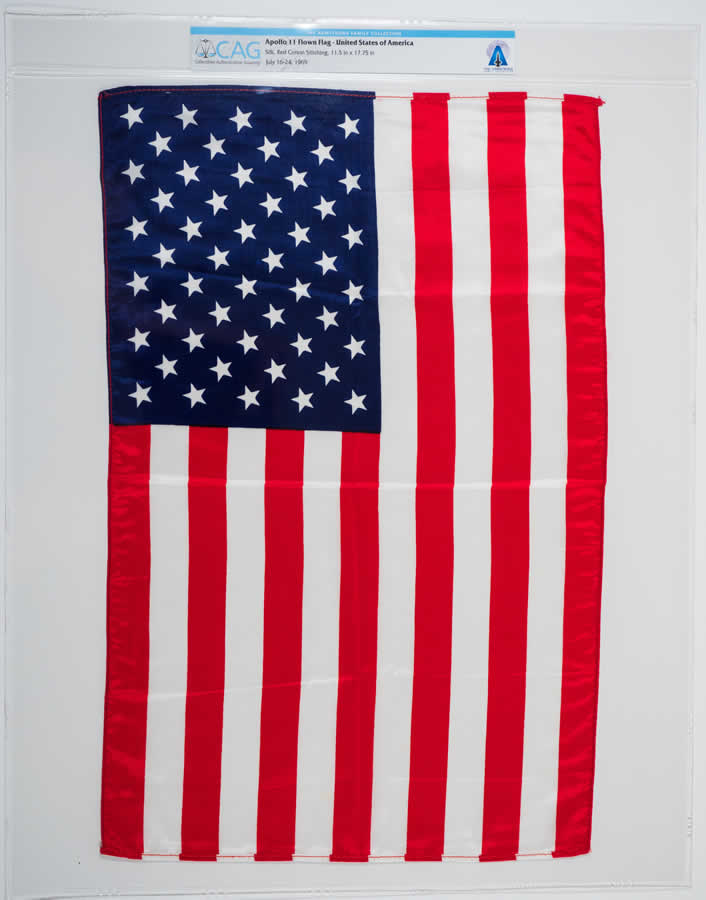
What’s the ultimate legacy of your dad, the way you believe he should be or he wanted to be remembered?
Mark: I’ve been asked this question many times and, surprisingly, my answers continue to evolve, so my 2018 answer is as follows. Dad was a hard-working man who always tried to do things in a way that he thought would set a good example for others. He was incredibly thoughtful about each and every decision in his life and he often said that he hoped to be remembered not for a single accomplishment, but rather for the full measure of all the contributions throughout his career. He shows us, by example, what it can look like when someone spends a lifetime of adhering to their core values and making one good thoughtful decision after another.
Rick: He was never about himself, so I would expect that he didn’t give much thought about how he would be remembered, and if he did, I don’t think that the astronaut part of this life would have been foremost anyway. With that being said, I think he would be pleased to be remembered as being part of a program that demonstrated amazing things can be achieved when people come together to dedicate themselves towards a common goal. I really believe that the inspiration he and the other astronauts provided to people all over the world is valuable beyond measure – and if the ongoing effects of that inspiration ultimately become the legacy of Apollo, he would be very happy with it.
HECTOR CANTÚ is editor of The Intelligent Collector. This story appears in the Fall 2018 edition of The Intelligent Collector magazine. Click here to subscribe.

